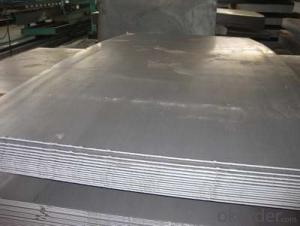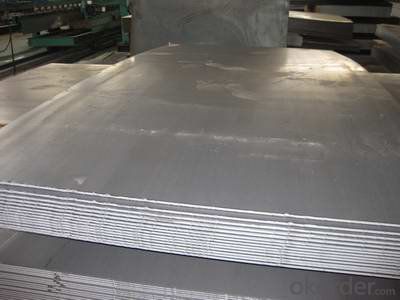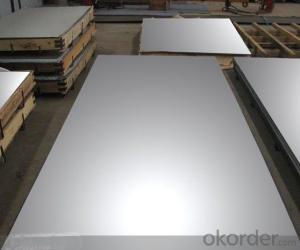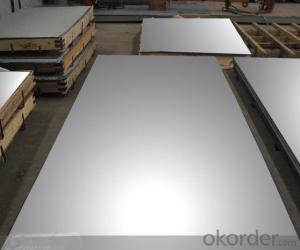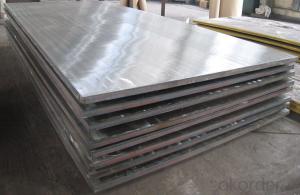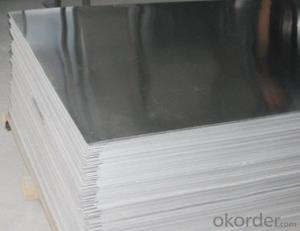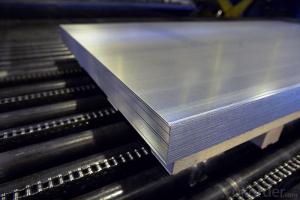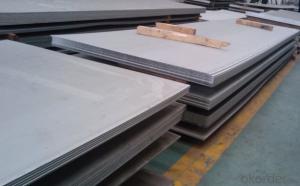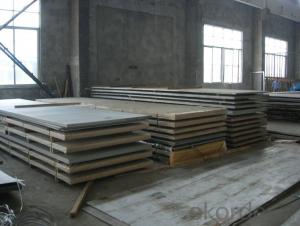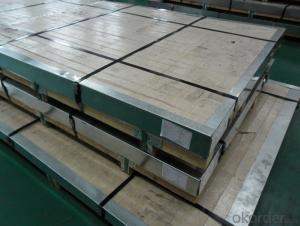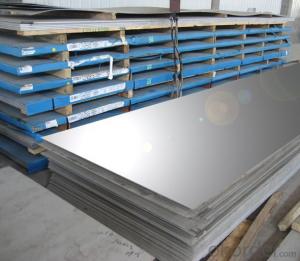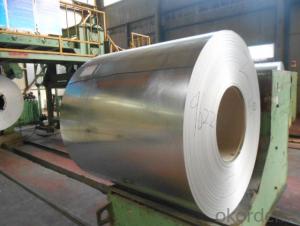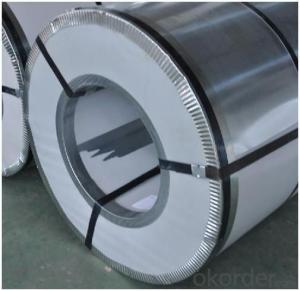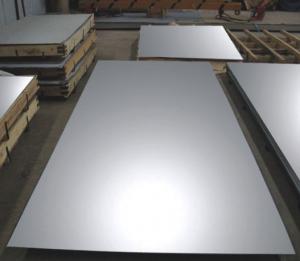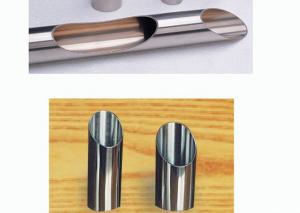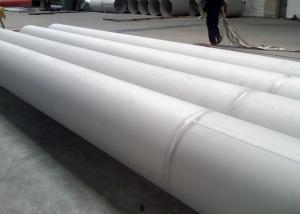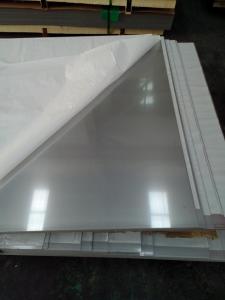Surface Finish Stainless Steel Sheet Plate 408 11% Cr and 8% Ni
- Loading Port:
- China main port
- Payment Terms:
- TT OR LC
- Min Order Qty:
- 50 m.t.
- Supply Capability:
- 10000 m.t./month
OKorder Service Pledge
OKorder Financial Service
You Might Also Like
Stainless Steel Sheet Plate 408 with 11% Cr and 8% Ni
Description:
304 stainless steel is the most widely used in the 300 series stainless steel. Its anti-corrosion property is stronger than the 200-series
stainless steel, but the anti-acid property is worse than 316. 304 stainless steel have a good resistance in high temperature and the
excellent corrosion resistance. 304 stainless steel is more expensive than 201, cheaper than the 316.
1. Commodity: 304 Stainless Steel
2. Technique: Cold Rolled/hot rolled Stainless Steel
3. Grade: 304 Stainless Steel
4. Type: Stainless Steel Sheet/coil
5. Finish: 2B/Ba/8K/Emboss/Etch
6. Edge: mill edge /silted edge
7.Size:1219mm*2438mm,1219mm*3048mm,or as customized
Main Features:
•Escalator, Elevator, Doors
•Furniture
•Production tools, Kitchen appliances, freezers, cold rooms
•Auto Parts
•Machinery and Packaging
•Equipment and Medical devices
•Transport system
Specifications:
Description | steel sheet,hot rolled steel sheet,cold rolled steel sheet, steel sheet,sheet,steel plate |
Standard | ASME, ASTM, EN ,BS,GB,DIN, JIS etc |
Application | Steel sheet applies to construction field, ships building industry, petroleum & chemical industries, war and electricity industries, food processing and medical industry, boiler heat exchanger, machinery and hardware fields. |
Packaging | Standard export sea-worthy packing |
Delivery time | 10-30 days |
Quality | No.1 |
Productivity | 500 tons/Day |
Note | Our company has cooperative relation between the domestic agents. Stainless steel sheet can be made accordingto the customers requirements. Fasten delivery. Quality assured. |
Contacts | If you have any question,please feel free contact me. |
Surface Finish Characteristics:
Surface finish | Characteristics and application |
2B | The surface brightness and flatness of no2B is better than no2D. then through a special surface treatment to improve its mechanical properties,No2B could nearly satisfy comprehensive uses. |
No.1 | Polished with abrasive belt of grit#100-#200, have better brightness with discontinuous coarse stria, used as inner and external ornaments for building, electrical appliances and kitchen utensils etc. |
No.4 | Polished with abrasive belt of grit #150-#180,have better brightness with discontinuous coarse stria, but thinner than No3, are used as bathtub buildings inner and external ornaments electrical appliances kitchen utensils and food processing equipment etc. |
HL | Polished with abrasive belt of grit #150-#320 on the NO.4 finish and has continuous streaks, mainly used as buildings ornaments elevators, door of building, frontal plate etc. |
BA | Cold rolled, bright annealed and skin-passed, the product have excellent brightness and good reflexivity like mirror, kitchen apparatus, ornament etc. |
8K | The product have excellent brightness and prefer reflexivity can to be the mirror. |
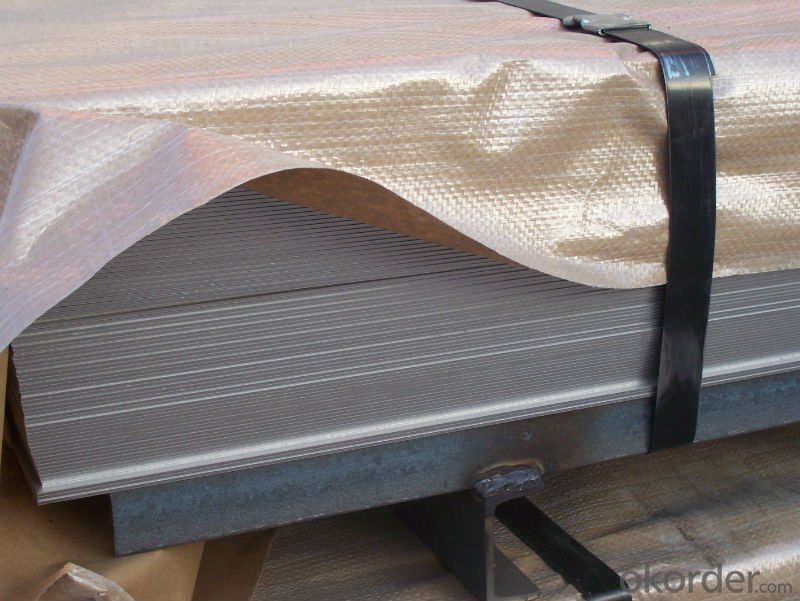
- Q: Are stainless steel sheets suitable for roofing applications?
- Yes, stainless steel sheets are suitable for roofing applications. Stainless steel is known for its durability, resistance to corrosion, and strength, making it an ideal material for roofs. It can withstand harsh weather conditions, including extreme temperatures, high winds, and heavy rainfall. Stainless steel sheets are also fire-resistant, which adds an extra layer of safety to the roof. Additionally, stainless steel has a long lifespan, requiring minimal maintenance and repairs. Overall, stainless steel sheets provide a reliable and long-lasting solution for roofing applications.
- Q: Can stainless steel sheets be used for outdoor furniture?
- Yes, stainless steel sheets can be used for outdoor furniture. Stainless steel is a highly durable material that is resistant to rust, corrosion, and weathering. This makes it an ideal choice for outdoor furniture as it can withstand the elements and retain its appearance and structural integrity over time. Additionally, stainless steel has a sleek and modern look that can complement various outdoor design styles. Whether it's for tables, chairs, or other outdoor furniture pieces, stainless steel sheets can provide a long-lasting and visually appealing option for outdoor use.
- Q: Can stainless steel sheets be used for railway infrastructure?
- Yes, stainless steel sheets can be used for railway infrastructure. Stainless steel is a versatile and durable material that offers various advantages for railway applications. Its corrosion resistance properties make it suitable for outdoor and high humidity environments, which are common in railway infrastructure. Stainless steel sheets can withstand harsh weather conditions, including extreme temperatures, rain, and UV radiation, without corroding or deteriorating. This makes them ideal for railway tracks, bridges, tunnels, and other structures that are exposed to the elements. Additionally, stainless steel sheets have excellent strength-to-weight ratio, allowing for the construction of lightweight yet sturdy railway infrastructure. This reduces the load on the overall structure and facilitates easier transportation and installation. Stainless steel is also resistant to fire and can withstand high impact, making it a reliable choice for railway applications where safety is a priority. Furthermore, stainless steel sheets are easy to clean and maintain, which is beneficial for railway infrastructure that requires regular upkeep. They can be easily polished to restore their aesthetic appeal and maintain a clean appearance. Stainless steel is also recyclable, making it an environmentally friendly choice for sustainable railway construction. In summary, stainless steel sheets can indeed be used for railway infrastructure due to their corrosion resistance, strength, durability, fire resistance, ease of maintenance, and sustainability.
- Q: What are the different methods of cutting stainless steel sheets?
- Depending on specific requirements and desired precision, there are several methods available for cutting stainless steel sheets. One commonly used method is shearing, which involves utilizing a machine with sharp blades to cut through the material. Shearing is ideal for straight cuts and offers a relatively fast and cost-effective solution. For high precision and intricate designs, laser cutting is a highly recommended method. It utilizes a powerful laser beam to provide a clean and smooth cut. This method is widely used in industries that prioritize precision and quality finishes. Plasma cutting, on the other hand, utilizes a high-temperature plasma arc to melt through stainless steel sheets. It is particularly suitable for cutting thick sheets or materials with high conductivity. This method offers fast cutting speeds and can handle various shapes and thicknesses. Waterjet cutting is a versatile method that involves using a high-pressure jet of water mixed with abrasive particles to cut through stainless steel sheets. It offers high precision and can create complex shapes. Additionally, waterjet cutting is a cold process, meaning it does not produce heat-affected zones or alter the material's structure. In situations where other methods are not feasible, abrasive cutting can be used. This method involves using an abrasive wheel or disc to grind and cut through stainless steel sheets. It can be done manually or with the assistance of power tools, such as angle grinders. The choice of cutting method depends on various factors, including the thickness of the stainless steel sheet, desired precision, budget, and production requirements. Each method has its own advantages and limitations, allowing for flexibility in choosing the most suitable option.
- Q: What do stainless steel 304 industrial surfaces refer to?
- Acid washing: pickling is the removal of oxide and rust on the surface of iron and steel by means of acid solutions. The parts are usually immersed in aqueous solutions such as sulfuric acid to remove oxides such as oxides on the metal surface. It is the pretreatment or intermediate treatment of electroplating, enamel and rolling etc..
- Q: Are stainless steel sheets resistant to intergranular corrosion?
- Yes, stainless steel sheets are generally resistant to intergranular corrosion due to the presence of chromium in their alloy composition. Chromium forms a protective oxide layer on the surface of stainless steel, preventing corrosive substances from penetrating the material and causing intergranular corrosion.
- Q: Can stainless steel sheets be used for cryogenic applications?
- Indeed, cryogenic applications can utilize stainless steel sheets. Stainless steel boasts remarkable mechanical properties, corrosion resistance, and low thermal conductivity, rendering it fitting for cryogenic settings. It endures frigid temperatures without succumbing to brittleness or weakening. Frequently, stainless steel sheets find employment in cryogenic applications like storage tanks, piping systems, and cryogenic equipment. Nevertheless, it is crucial to select the proper grade of stainless steel, specifically intended for cryogenic applications, to guarantee utmost performance and durability.
- Q: Can stainless steel sheets be used for stairs and railings?
- Yes, stainless steel sheets can be used for stairs and railings. Stainless steel is a durable and corrosion-resistant material that is commonly used for architectural purposes, including stairs and railings. Its strength and aesthetic appeal make it suitable for both indoor and outdoor applications.
- Q: Can stainless steel sheets be used in high-pressure applications?
- Stainless steel sheets are indeed applicable in high-pressure scenarios. Renowned for its remarkable resistance to corrosion and impressive strength, stainless steel is suitable for a variety of industrial uses, especially those involving high-pressure conditions. Its exceptional strength enables it to endure the force exerted by high-pressure fluids or gases without distorting or breaking. Moreover, stainless steel sheets can be shaped and sized as desired, facilitating their utilization in a wide array of high-pressure applications such as pressure vessels, pipelines, hydraulic systems, and heat exchangers. All in all, stainless steel sheets are a dependable and long-lasting option for high-pressure circumstances due to their inherent strength and corrosion resistance characteristics.
- Q: Can stainless steel sheets be used for electrical enclosures?
- Yes, stainless steel sheets can be used for electrical enclosures. Stainless steel is a highly durable and corrosion-resistant material that provides excellent protection for electrical components. It has high strength and can withstand harsh environmental conditions, making it suitable for both indoor and outdoor applications. Additionally, stainless steel has good conductivity and can dissipate heat efficiently, which is crucial for maintaining proper temperatures within the enclosure. This makes stainless steel sheets a reliable choice for electrical enclosures, offering long-lasting performance and protection for the enclosed electrical equipment.
Send your message to us
Surface Finish Stainless Steel Sheet Plate 408 11% Cr and 8% Ni
- Loading Port:
- China main port
- Payment Terms:
- TT OR LC
- Min Order Qty:
- 50 m.t.
- Supply Capability:
- 10000 m.t./month
OKorder Service Pledge
OKorder Financial Service
Similar products
Hot products
Hot Searches
Related keywords
